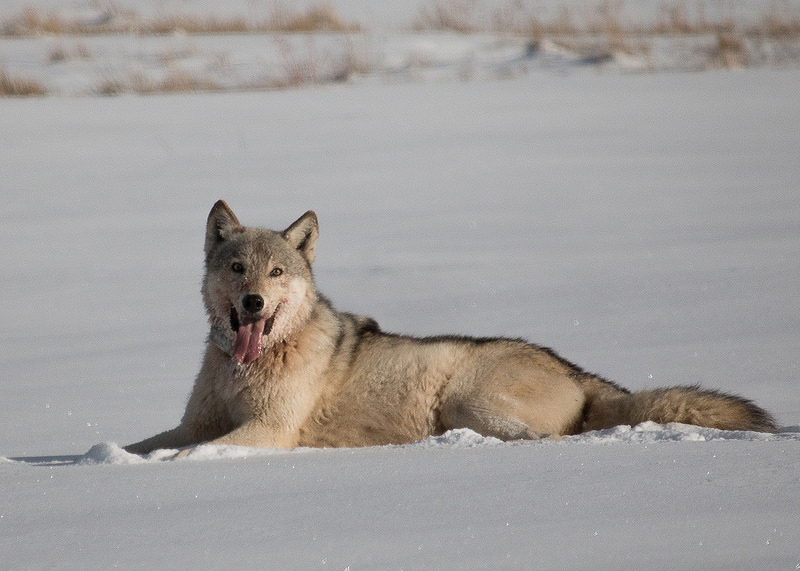Wolf Annual Report public meeting April 21

by ODFW
4-12-2017
Website
ODFW releases its 2016 Wolf Annual Report and a Draft Revised Wolf Management Plan. Find both documents at ODFW’s Wolf webpage (dfw.state.or.us/wolves)
These documents will be presented (for information only, not adoption) at the upcoming Fish and Wildlife Commission meeting on April 21 in Klamath Falls. The draft Plan will also be presented at a second Commission meeting on May 19 at the Embassy Suites Portland Airport. Public comment is welcome at both meetings or at odfw.commission@state.or.us.
Below are some highlights from the Annual Report, which summarizes 2016 wolf management activities and results of annual winter surveys:
- ODFW counted 112 known wolves in Oregon in 2016, up two wolves from 2015. Counts are based on verified evidence (like tracks, sign, remote camera photographs, visual observations) and are considered a minimum known population. Severe winter weather made counting wolves much more challenging this year.
- Surveys documented 11 packs and eight of those were breeding pairs.
- 2016 was the third consecutive year of more than seven breeding pairs in eastern Oregon which moved the East Wolf Management Zone into Phase 3 of wolf management.
- The wolf population continued to expand in distribution, with new areas of wolf activity in northeast and southwest Oregon.
- Two previously occupied areas of wolf activity have changed, including the newly named Harl Butte Pack which is using part of the area previously held by the Imnaha pack.
- ODFW radio-collared 11 wolves last year.
- Staff monitored collared wolves in ten groups during 2016.
- ODFW confirmed 24 livestock depredation events by wolves in 2016, an increase from 2015.
- Seven mortalities were documented during 2016, including three radio-collared wolves.
For more details, see the Annual Report.
ODFW also released an updated draft Wolf Conservation and Management Plan today. The draft Plan is the result of a year-long review process to evaluate its effectiveness and address opportunities for improvement. It incorporates the latest science about wolves and includes new sections on potential conservation threats to wolves and non-lethal measures to prevent wolf-livestock conflict. It also updates base information about wolf status, population and distribution, plus management improvements based on actual field experience with wolves.
This current review has the benefit of large amounts of Oregon-specific wolf data. “When the Plan was first developed, Oregon had no known wolves and relied heavily on information from other states,” said Russ Morgan, ODFW wolf program coordinator. “This review of the Plan incorporates more information from Oregon, and adds a great deal of new science about wolves.”
The draft Plan maintains the original Plan’s goals and aims to keep its original intent. The Plan was first negotiated between stakeholders and adopted by the Commission back in 2005 after ODFW’s largest-ever public process. The draft Plan offers more details on several policies agreed on in the original Plan.
For example, the original Wolf Plan allowed controlled take of wolves in Phase 3 only, and only in two specific circumstances; 1) situations of chronic livestock depredation, or 2) if wolves are determined to be causing declines in ungulate populations such as deer and elk. This draft Plan does not change that intent, but does add additional guidelines and specific prerequisites for when this type of take can occur. The draft Plan also continues the policy of not allowing general seasons of wolf hunting or trapping in Oregon.
Other policy issues addressed in the draft Plan include:
- The definition of chronic depredation is proposed to become more stringent in Phases 2 and 3. The current definition is two confirmed or one confirmed and three attempted depredations with no time period set. The new proposed definition is three confirmed depredations or one confirmed and four probable depredations within a 12-month period.
- The requirements to use non-lethal measures before consideration of lethal control of depredating wolves continue.
- A citizen advisory group is proposed to improve information sharing and collaboration between ODFW and stakeholders.
- As the wolf population increases, the use of monitoring methods which do not require capture of wolves (like howling and track surveys, camera surveillance, aerial surveys) will become increasingly important. Staff will continue to attempt to collar wolves, but other survey methods will be explored.
The presentation of the updated draft Plan during the April and May meetings is considered informational only; the Draft Plan will not be considered for adoption at these meetings. A date for final consideration and adoption of the Plan has not yet been set.
Comments on the Draft Plan may be provided to odfw.commission@state.or.us or in-person at the meetings.
For more information on wolves in Oregon, visit dfw.state.or.us/wolves
More Reports
Family fishing event coming up at St. Louis Ponds
St. Louis Ponds
4-11-2017
The Oregon Department of Fish and Wildlife will host another free family fishing event Saturday, April 15 at St. Louis Ponds near...... Read More
OR Department of Fish & Wildlife Reports
for Friday, April 7th, 2017• Trophy trout and $50 reward tags await Willow Creek anglers
